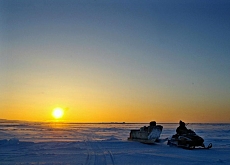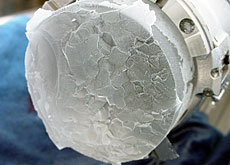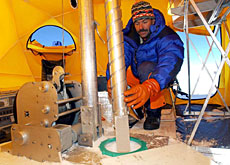Swiss mark 50 years of polar research

Swiss scientists have been active in polar research for more than half a century and a conference in Grindelwald has taken stock of their achievements.
A groundbreaking glaciological expedition to Greenland in the 1950s marked the start of Switzerland’s involvement. This has continued over the decades, although the areas of research have changed.
In addition to scientists and researchers from all around the world, the four-day conference was attended by surviving members of the Greenland expedition.
“The importance of that expedition is that it was a Swiss undertaking and it was very successful,” said Christian Schlüchter, a geologist who represents Switzerland at the Scientific Committee on Antarctic Research.
“It brought back a substantial amount of documentation, illustrations, early photographs and so on,” he told swissinfo. “It really opened the door to Swiss participation in this field.”
Heinz Blatter, from the Institute for Atmospheric and Climate Science at the Federal Institute of Technology in Zurich, told swissinfo the expedition “really set a benchmark for future projects in Greenland”.
Pole position
Since then, Swiss involvement at the poles has seen some remarkable successes.
Researchers at Bern University have made a name for themselves decrypting information from ice cores, developing methods that have allowed them to draw data from the smallest samples.
“In ice coring and climate reconstruction Bern is at the leading edge,” Blatter said.
Switzerland has also designed and built drill heads for boring deep into the ice cap. These were used on the last big core project in Antarctica, which lasted eight years.
Studies at the Federal Institute of Technology in Zurich have shown that the short-term outlook is for ice caps to keep on shrinking, which is likely to affect coastal populations.
In October 2004 Switzerland finally became a full member of the international Scientific Committee on Antarctic Research, after 20 years of regular polar studies.
Challenges
But polar research for a small European country is not without challenges – and not all of them geographical.
“It’s difficult to say that Switzerland is at the forefront,” said Blatter. “It is still contributing substantially to polar research, but it’s really an international activity and Switzerland is a part of it.”
He added: “It’s a problem of funding – if you’re not a professor, it gets difficult.”
Despite this, Blatter said interest from the next generation of Swiss scientists remained strong.
“When I look at the list of International Polar Year proposals, many young people are participating but mostly in projects initiated by people abroad.”
Schlüchter said the main reason why Switzerland can participate in these projects is because it can contribute expertise in very specific fields – “there are glaciers in the Alps so we are familiar with this environment”.
Momentum
On three occasions over the past 125 years (in 1882-83, 1932-33 and 1957-58) scientists from around the world have banded together to organise scientific and explorative projects in the polar regions.
Such international scientific cooperation has paved the way for several political accords. International Polar Year 2007-2008 aims to expand upon this legacy of scientific achievement and benefits to society.
To ensure that researchers get the opportunity to work in both polar regions and work summer in addition to winter, the Polar Year will run from March 2007 to March 2009.
“The major thing is for International Polar Year as a whole to bring forward a much broader awareness of current polar research and the importance for the polar areas for our planet,” Schlüchter said.
swissinfo
The three fastest-warming regions on the planet in the past two decades have been Alaska, Siberia and parts of the Antarctic Peninsula.
Melting sea ice in the Arctic due to rising temperatures is causing declines in ice algae crucial to the entire Arctic food chain, from fish to seals and polar bears.
Scientists believe global warming is caused by the release of greenhouse gases into the atmosphere by industrialised nations.
There have been a number of major international polar initiatives since the first International Polar Year in 1882-83.
The last such initiative was the International Geophysical Year in 1957-58, involving 80,000 scientists from 67 countries, including Switzerland.
An International Polar Year in 2007-2008 aims to engage young scientists and to make the public aware of the polar regions’ importance.
The International Glaciological Greenland Expedition was founded in Grindelwald on April 4, 1956 and has played a major part in polar research ever since.
A conference to mark the 50th anniversary of the International Glaciological Greenland Expedition took place from May 8-12 in the alpine village.
The symposium was organised by the Swiss Committee on Polar Research and the Commission for the Cryogenic Sciences.
Grindelwald in the Bernese Oberland is the usual starting point for ascents of the Eiger and the Wetterhorn.

In compliance with the JTI standards
More: SWI swissinfo.ch certified by the Journalism Trust Initiative



You can find an overview of ongoing debates with our journalists here. Please join us!
If you want to start a conversation about a topic raised in this article or want to report factual errors, email us at english@swissinfo.ch.